Click Here to Download PDF Version
Telehealth Newsletter
Official Newsletter of Tamil Nadu Chapter of Telemedicine Society of India
| What is New?
The highlight of November 2022 has been the annual national conference at Kochi at Amrita Hospital and a report by Mr. Bijoy with pictures are presented. Kerala has been at the forefront of Telemedicine since the year 2002 and Amrita has an established department that has indeed helped its growth. In fact Amrita had also started a postgraduate course on the subject by Dr. Ajith Babu during the same time. Last month there was another interesting telehealth event at Delhi organised by Dr. Rajenra Gupta, one of our TSI members. This was entitled – Global Digital Health Summit. There were apparently 1706 registrations but considering the COVID protocol they approved 750. There were 680+ participants from across the globe. This month the Ministry of Electronics and Information Technology has invited feedback on the draft ‘Digital Personal Data Protection Bill, 2022.’ Our legal expert – Bagmisikha Puhan has sent her expert comments. Do go through the bill and send your feedback to the ministry. The link has been provided. Thank You |
TELEMEDICON2022 at Kochi
M.G. Bijoy
Telemedicon Organizing Secretary,
Kochi
Highlights of 18th International Telemedicine Conference hosted by TSI Kerala Chapter in association with Amrita Hospital.
KOCHI: The three-day 18th international conference, ‘Telemedicon 2022’ of the Telemedicine Society of India with TSI Kerala Chapter, took place at Amrita Hospital in Kochi . Dr. Mohanan Kunnummal, Vice-Chancellor Kerala University of Health Sciences, inaugurated the conference. State IT Secretary Dr. Ratan Khelkar,IAS; Dr. Prem Nair; Group Medical Director, Amrita Hospitals, Chairman Telemedicon 2022 and TSI Kerala Chapter, Dr.P K Pradhan,President,TSI, M.G. Bijoy, Telemedicon Organizing Secretary, TSI Secretary,Dr. Murthy Ramila were among the dignitaries who spoke at the inaugural function. ISRO Chairman S. Somnath conveyed his best wishes through a video message.
Delivering the speech, Dr. Mohanan Kunnummal said that telemedicine has legal protection across the country, and with the shift to 5G, telemedicine will become popular. The advancement of technology and network connectivity will open up even better possibilities in telemedicine. He said that the days are coming when many modern technologies will have a decisive impact on telemedicine. Virtual reality and augmented reality will open up more opportunities for telemedicine. “The new technologies will help create the impression of getting tested sitting next to the patient,” he further added.
Dr. Prem Nair, Chairman of Telemedicon 2022, President of TSI Kerala Chapter, and Group Medical Director of Amrita Hospitals, delivered the introductory speech. He said telemedicine could help bring down the cost of health care. He also noted that 5G connectivity will strengthen the telemedicine system across the country, saving the time it takes to save the lives of critically ill patients and that telemedicine can be used effectively in situations where a wearable device is used.
“We are one of the early adopters of telemedicine in the state of Kerala. It primarily started as a programme to bridge the physical distance between care providers and patients, he said. Now we are making use of state-of-the-art technologies to expand telemedicine services. Our expertise, clinical care, technology research, and social commitment help us deliver technology-enabled care. “When we started our activity in Kerala in 2002, in association with ISRO, we aimed to provide early healthcare services at affordable cost. Today, after 17 years, we provide telemedicine services to 60 national and nine international centers,” he added.
ISRO Chairman S Somnath attended the conference virtually. He explained the steps taken by ISRO in the initial phase of telemedicine. He said that the growth and integration of technologies are very promising. Telemedicine will witness revolutionary changes as connectivity facilities further improve. Telemedicine connectivity can be strengthened, and the services can be expanded in rural areas with the spread of connectivity through satellites. He pointed out that there will be significant changes in healthcare services with the improvement of connectivity between patients and doctors through applications.
Kerala IT Secretary Ratan Kelkar said, “Startups, private entrepreneurs, and technology partners should come forward to promote telemedicine. He also mentioned that greater participation is essential for the sector’s growth as 5G has provided the best background.Also assured all the support for the digital health initiatives in Kerala”
Expert speakers from WHO presented the Telemedicine Guidelines released by WHO and also about advancements in AI.
Govt of India’s Telemedicine platform was detailed by E-Sanjeevani Man Dr.Sanjay Sood.
The Valedictory function was inaugurated by Mr. K.S. Srinivas IAS, Principal Secretary, Tourism. Mentioned about the possibilities of health tourism connecting Telemedicine.
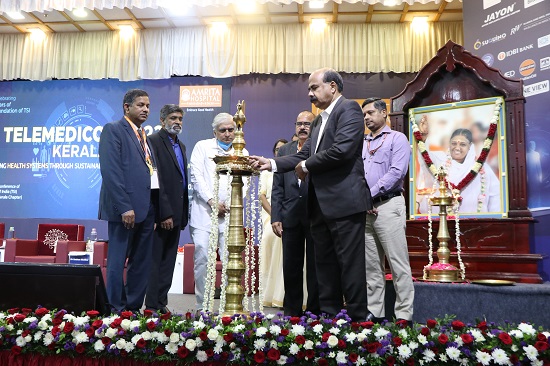
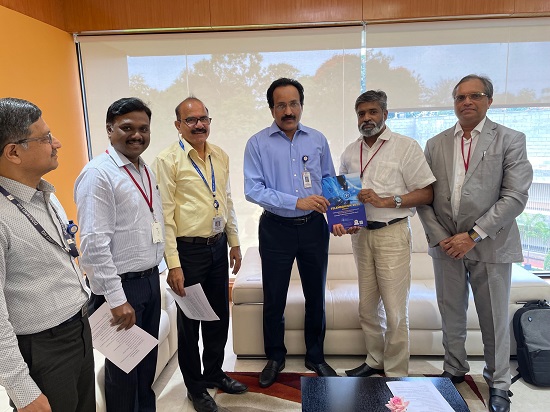
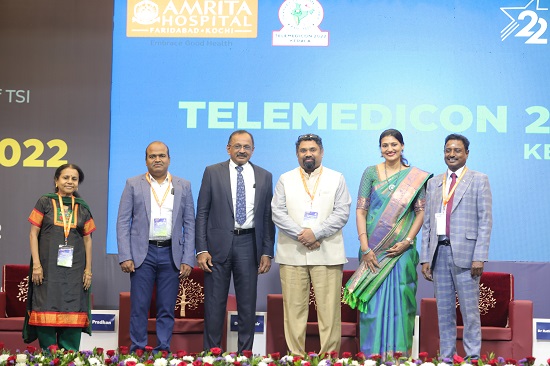
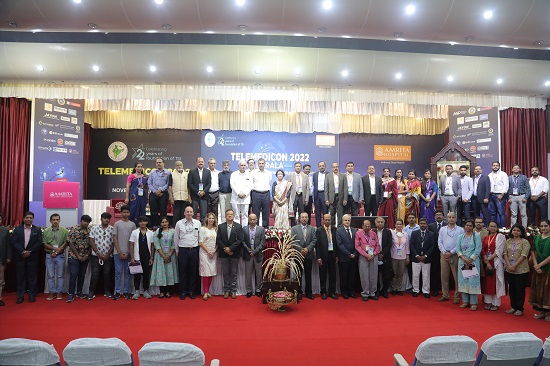
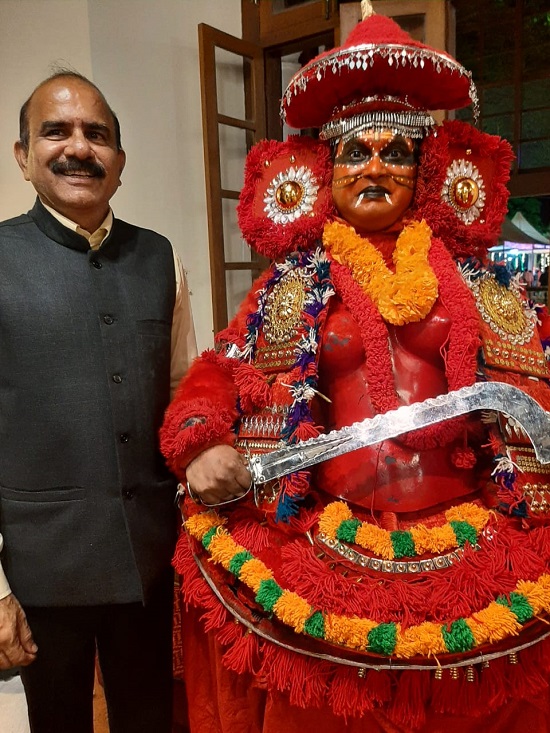
Public Consultation on the draft ‘Digital Personal Data Protection Bill, 2022’
The Ministry of Electronics and Information Technology invites feedback on the draft ‘Digital Personal Data Protection Bill, 2022’.
Ministry of Electronics and Information Technology has been deliberating on various aspects of digital personal data and its protection, and has formulated a draft Bill, titled ‘The Digital Personal Data Protection Bill, 2022’.
The purpose of the draft Bill is to provide for the processing of digital personal data in a manner that recognizes both the right of individuals to protect their personal data and the need to process personal data for lawful purposes, and for matters connected therewith or incidental thereto.
The draft Bill employs plain and simple language to facilitate ease of understanding and is available on Ministry’s website at https://www.meity.gov.in/data-protection-framework, along with an Explanatory note that provides a brief overview of its provisions, which is available at https://www.meity.gov.in/data-protection-framework
The Digital Personal Data Protection Bill frames out the rights and duties of the citizen (Digital Nagrik) on one hand and the obligations to use collected data lawfully of the Data Fiduciary on the other hand.
The bill is based on the following principles around the Data Economy: The Bill will establish the comprehensive legal framework governing digital personal data protection in India. The Bill provides for the processing of digital personal data in a manner that recognizes the right of individuals to protect their personal data, societal rights and the need to process personal data for lawful purposes.
The Ministry has invited feedback from the public on the draft Bill. The submissions will not be disclosed and held in fiduciary capacity, to enable persons submitting feedback to provide the same freely. No public disclosure of the submissions will be made.
The feedback on the draft bill in a chapter wise manner may be submitted on https://innovateindia.mygov.in/digital-data-protection/ by 17 th December 2022.
 Special Note About the Digital Personal Data Protection Bill, 2022
Special Note About the Digital Personal Data Protection Bill, 2022
Bagmisikha Puhan
Associate Partner, TMT Law Practice
The Ministry of Electronics and Information Technology (MeitY) released the latest iteration of the data protection framework, christened as the Digital Personal Data Protection Bill, 2022 (Bill) for public consultation. At the outset, it appears that the Bill has sought to ease compliance requirements applicable upon start-ups, and has scrapped the erstwhile data localization requirements, which have been a consistent inclusion within the previous iterations issued by MeitY.
The preliminary relevant highlights of the Bill have been captured herein:
- The objective of the Bill has been watered down, to remove protection of interest and security of State, and refocuses on the need to process digital personal data in a manner, which recognizes the right to privacy of individuals, who’s data is being processed by an entity.
- The qualified title adding “Digital” seems to reflect the association of this Bill, with the slew of policies the Government intends to roll out to achieve a “Digital India”.
- The Bill does not scope in non-personal data and has diluted the scope of what would constitute as harm, to an individual for the illegitimate processing of their data.
- The definition does not address “loss of reputation”, “loss of employment”, “psychological manipulation”, and has been provided broad stroke indicators for what would constitute as harm under the Bill.
- The Bill has extra-territorial application and extends to any businesses which process Indian user data in connection with any profiling of, or activity of offering goods or services to Indian users within the territory of India.
- The Bill has rechristened the chapter on Grounds for Processing of Personal Data without Consent from the previous iteration to Deemed Consent, for optics and ease of understanding for the user.
- Data fiduciaries are required to notify the Data Protection Board, to be constituted in accordance with this Bill, in the event of a personal data breach; this may create overlap in compliance obligations, as data fiduciaries are required to report personal data breaches to CERT-In as well.
- The Bill permits for contractual arrangements with sub-processors as well; and has limited the scope of data principal rights from the previous iteration. The Bill does not provide for a right to be forgotten, right to data portability; this may be intended towards easing the compliance burden on start-ups, as it may necessitate massive technological overhaul to be able to offer such rights to the end users. The Bill further provides a right of grievance redressal to users, as well as a right to nominate an individual to exercise such rights, in the event of the death of the data principal.
- Significant Data Fiduciaries, which will notified by the Government basis the volume of data processed, risks, shall be required to appoint a Data Protection Officer as well as an Independent Data Auditor, to review the organization’s compliance with the provisions of the Bill.
- The Bill does not provide any references to compliances necessary to transfer data outside India. The Central Government has retained the power to notify such countries where cross border data transfers may be executed, upon an assessment of factors to be specified at a later stage by the Central Government.
- The Bill permits entities to make a voluntary undertaking with respect to any compliance requirements, where a proceeding has been initiated before the Data Protection Board. A similar provision was included within the draft Telecommunications Bill, 2022; we surmise that such provisions are intended to reduce dispute resolution proceedings in front of the Board. An appeal against any order of the Board shall lie to the High Court.
- The Bill caps the financial penalties for violation of the provisions of this Bill at 500 crore rupees. The Bill further provides for a penalty against a data principal, where the data principal has submitted a frivolous grievance with the Data Protection Board.
Global Digital Health Summit at Delhi
Global Digital Health Summit was held at Vigyan Bhavan, Delhi and was called an action summit. It led to important launches which will pave the way for ‘Digital Health for All by 2028.’ This is envisaged to be critical for the success of India’s journey in digital health. This summit witnessed the following launches:
- Release of ‘Digital Health For All by 2028’- Declaration by Dr. Jitendra Singh, Hon’ble Union Minister of State, Prime Minister’s Office
- Launch of the first Women’s Health Guideline with a holistic approach
- ‘Project Concern- 2028’ for taking Digital Health to pharmacies across India
- Campaign on ‘Women for Digital Health’
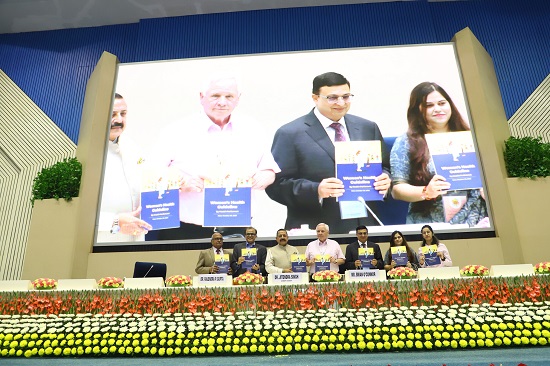
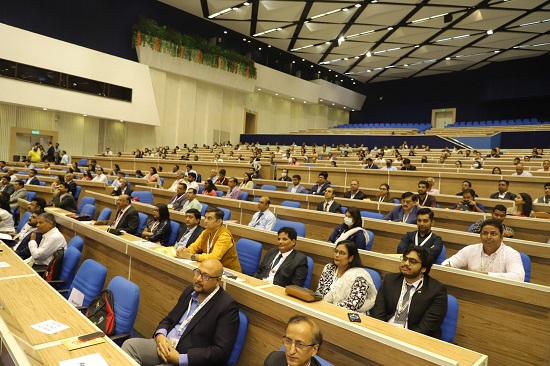
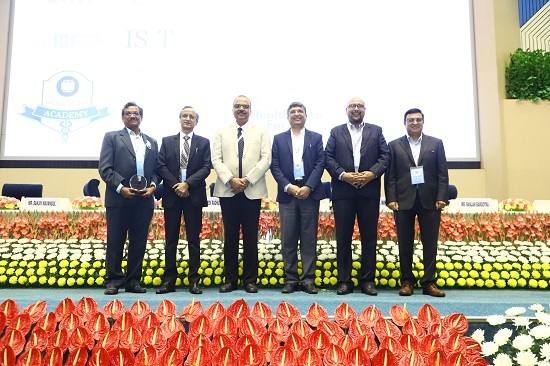
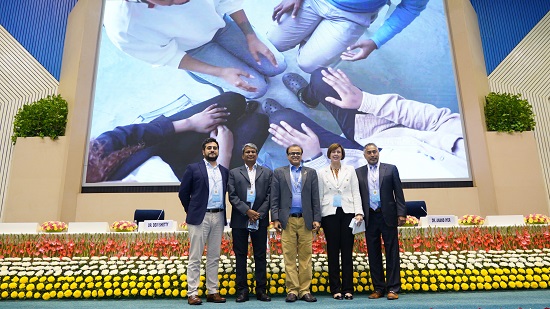
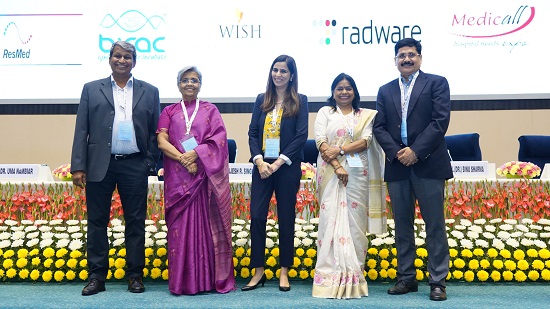
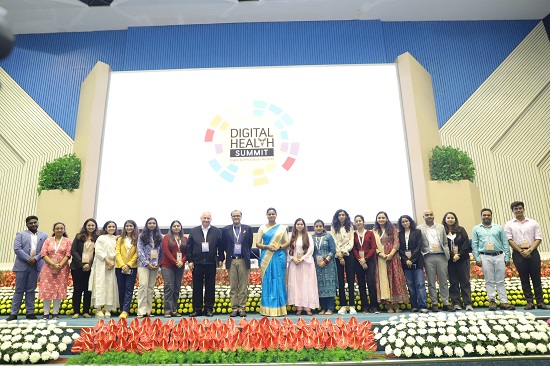
Telemedicine – News from India & Abroad
Telehealth Program Helps Reduce Blood Pressure
After 12 weeks of a telehealth support program, with or without support from a dietitian, people with elevated blood pressure saw improvement.A research team led by Alexander Chang, M.D., Geisinger nephrologist enrolled two groups of patients with high blood …Readmore
Artificial Intelligence Tailors DNA For Drug Development
With the help of artificial intelligence/AI technology, researchers have designed synthetic DNA that controls the cells’ protein production.How our genes are expressed is a process that is fundamental to the functionality of cells in all living organisms. Simply put, the genetic code in DNA is transcribed ….Readmore
Artificial Intelligence Tool Predicts Decreased Blood Flow to the Heart
The artificial intelligence tool developed used computed tomography (CT) scans to spot patients at risk of reduced blood flow to the heart.Blockages of the coronary arteries typically occur due to the buildup of fatty plaques. This may restrict blood flow to the heart, causing chest pain, heart attacks …Readmore
Skin-like Electronics Help Monitor Health
A skin-like device developed by researchers does a personalized analysis of the tracked health data while minimizing the need for its wireless transmission. Worn routinely, future wearable electronics could potentially detect possible emerging health problems — such as heart disease, cancer…Readmore
Click here to Become a Member of Telemedicine Society of India
Telemedicine Practice Guidelines – A Foundation Course for RMPs by TSI Faculty
To know more about the Telemedicine Foundation Course click on the link below:
https://tsitn.org/tpg-course/
TN – TSI invites all the TSI Chapters and Members to submit information on their upcoming Webinar or Events (50 words), News related to Telemedicine (200 words) or short articles (500 words) for the monthly e-newsletter.Guidelines for submission to TN TSI Newsletter-
|
Submission may be sent to – tsigrouptn@gmail.com
Editors reserve the rights for accepting and publishing any submitted material.
Editor in Chief – Dr. Sunil Shroff
Editors – Dr. Senthil Tamilarasan & Dr. Sheila John
Technical Partner- https://www.medindia.net


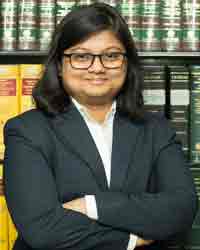 Special Note About the Digital Personal Data Protection Bill, 2022
Special Note About the Digital Personal Data Protection Bill, 2022